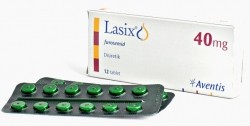Furosemide Precautions
 To finish off this 4 part article Drugs! are you on a diuretic, I will show you some questions written by worried patients prescribed diuretics. If you’re on this class of drugs, you may find a question here relating to you and problems you are encountering. As Furosemide is a diuretic that is one of the most prescribed drugs in the world, questions about this particular drug will be covered here. Click for Part 1, Part 2 and Part 3.
To finish off this 4 part article Drugs! are you on a diuretic, I will show you some questions written by worried patients prescribed diuretics. If you’re on this class of drugs, you may find a question here relating to you and problems you are encountering. As Furosemide is a diuretic that is one of the most prescribed drugs in the world, questions about this particular drug will be covered here. Click for Part 1, Part 2 and Part 3.
Over 7 million users in the US
Over 7 million US citizens were prescribed this diuretic to lower hypertension (high blood pressure) up to 2012. I can’t find an up to date figure but you can imagine what a money spinner this drug is.
This was to reduce water retention by duping the kidneys to shed more fluid than they would normally do. Also, that lost fluid would contain precious minerals and nutrients that would have been salvaged through a secondary filtering system that naturally happens with normal kidney function. In other words, this drug changes the way kidneys normally function, to the detriment of the filtering process.
 Furosemide (Lasix) – A loop diuretic
Furosemide (Lasix) – A loop diuretic
Furosemide (Lasix) is a “loop” diuretic, meaning that it affects a special part of the kidney called the loop of Henle to facilitate salt elimination from the body. This medication not only kicks sodium out of the body (considered a beneficial action), it also promotes removal of other key minerals such as magnesium, potassium and calcium. Many health professionals are aware of the potassium problem, but they may ignore the depletion of magnesium. Low levels of magnesium and potassium can have devastating consequences.
Makes pharmaceuticals billions of $ every year
This drug is one of the most prescribed drugs in the world, are you on it? Here are some question asked by worried patients about furosemide which brings in billions of dollars to the pharmaceutical industry every year.
This patient should change his Dr.
“My husband’s doctor is concerned about his blood pressure. It has been fine until three days ago when at the doctor’s office it was 140/80. (When we got home it was 125/75). The doctor doubled his dose of furosemide.
I frankly am afraid he is going to end up in the hospital! I would like to learn more  about this drug. My husband fortunately works close to home; he sometimes urinates on himself because he can’t always make it to the bathroom in time. He does operate heavy equipment at times and the dizziness thing is scary too. Please tell us more about furosemide (Lasix) side effects.”
about this drug. My husband fortunately works close to home; he sometimes urinates on himself because he can’t always make it to the bathroom in time. He does operate heavy equipment at times and the dizziness thing is scary too. Please tell us more about furosemide (Lasix) side effects.”
White coat syndrome
This is absolutely disgraceful. Doubling the dose of Lasix just because someone exhibits a slightly high BP reading is scandalous, especially as his BP dropped as soon as he got home. This is a typical example of “White Coat Syndrome”. Be thankful you don’t have this medic as your doctor. But be aware, this is the kind of nonsense that happens. You MUST be au fait with your own body and say NO if you don’t agree with the doctor. After all, it’s you taking these drugs and taking the risk of side effects not him!
 Overactive bladder
Overactive bladder
It is known that this drug can cause an overactive bladder causing frequent urination which sometimes is uncontrollable by the sufferer. (BMC Geriatrics, June 10, 2013). Unnecessary doubling of his dose of Lasix will only exacerbate the problem. There seems to be no consideration for the patient when these drugs are dished out willy nilly. Why should this man have to put up with these side effects?
Dereliction of duty
No attention has been given to this patient’s occupation. Operating heavy machinery whilst suffering the side effects of dizziness or vertigo is an accident waiting to happen. This just confirms that this doctor failed in his duty to make sure his patient had the best possible medication for his particular lifestyle. This is a dereliction of duty in my mind, apart from the obvious misery it is causing the patient and his wife.
whilst suffering the side effects of dizziness or vertigo is an accident waiting to happen. This just confirms that this doctor failed in his duty to make sure his patient had the best possible medication for his particular lifestyle. This is a dereliction of duty in my mind, apart from the obvious misery it is causing the patient and his wife.
Lasix’s potential to cause kidney damage
“As part of the medications I take for high blood pressure, I take Lasix two times per day, 40 mg each. I am concerned as I just read that Lasix can potentially cause kidney damage or gout when taken over a period of time. I am very concerned that I have never been told about these serious side effects from my doctor. Are they true?”
Medics must inform!
Again, here is another example of medics not doing right by his patient. The most common side effects should be made clear so that the patient can come back to the doctor if he suffers them. How is the patient expected to know that something he has is due to the drug he is taking. Many people will just think they have the flu or their back aches because of the gardening etc.. Patients must be kept informed. The information must be given by the doctor. This patient actually looked up for himself what the side effects may be for this drug. So now he is turning to other means to find out for himself, which means he has lost faith in his doctor.
 “My mother had swelling in her ankles, she only weighed 74 lbs. Her Dr. prescribed her lasix 40 mg.
She took one time day. We had home health nursing too. Mom was feeling weaker loss of appetite. They couldn’t figure out what’s wrong. About week Mom says let’s go to Hosp. we waiting for results, her body had no sodium.
Dr. didn’t prescribe potassium with her lasix…we were in Hosp 2 wks . We were home 2wks. She never recovered from that. I lost her…do u believe Dr. is responsible…I do.”
“My mother had swelling in her ankles, she only weighed 74 lbs. Her Dr. prescribed her lasix 40 mg.
She took one time day. We had home health nursing too. Mom was feeling weaker loss of appetite. They couldn’t figure out what’s wrong. About week Mom says let’s go to Hosp. we waiting for results, her body had no sodium.
Dr. didn’t prescribe potassium with her lasix…we were in Hosp 2 wks . We were home 2wks. She never recovered from that. I lost her…do u believe Dr. is responsible…I do.”
Medics MUST learn about electrolytes
As for the 2nd patient, words fail me. What a terrible mistake not to make sure all electrolytes are replete, especially in an older patient. This poor lady met her demise probably because she lacked the electrolytes for her body to survive. This is such a real danger with diuretics.
No nutritional knowledge required to be an MD!
Did you know that in the UK, medical school has just 1 day out of 6 years spent on learning about nutrition and these lessons are not compulsory so many don’t attend. There is no requirement for knowledge of nutrition to become an MD. I suspect many patients know more about nutrition than their doctors!
 Are doctors in control?
Are doctors in control?
There seems to be a serious and life threatening problem with medics just not knowing their stuff when it comes to prescribing these serious drugs. Why don’t medics know how minerals and other nutrients work. Or is there something else going on? Are doctors losing control to a larger machine?
Drugs have to be processed
One of the most serious side effects of this drug and other diuretics (and many other drugs) is kidney damage. After all, drugs must be processed through the kidneys so this delicate system has to cope with alien chemicals which are changing the way the kidneys work.
European Heart Journal says…
European Heart Journal. Cardiovascular Pharmacotherapy, June 19, 2017 reports that kidney damage is a possible adverse reaction to this drug. Although this side effect is listed in the leaflet that comes with the drug, it seems to be unknown to those medics that prescribe it. Those patients that suffer the consequence of regularly taking this drug will no doubt consider themselves just unlucky to have succumbed to kidney disease. This despite the likely cause to be the furosemide they regularly take.
Gout can be caused by furosemide
“I had gout attacks only when I was taking Lasix. My uric acid levels were 11. I have not had any attacks since discontinuing the Lasix.”
Gout is another possible side effect of furosemide which is brought about by elevated levels of uric acid. Arthritis & Rheumatology, Dec. 29, 2011 onlinelibrary.wiley.com/doi/10.1002/art.33315/abstract)).
One medic says No, the other says Yes
“I take prescribed 20 mg Lasix twice a day. One doctor says to take potassium with it, but another doctor says no. I don’t know what to do.”
Depletion of vital minerals
It is known that furosemide depletes the body of minerals such as magnesium (Mg) and potassium (K). A common practice is to test the patient for deficiencies in these important minerals. Problem is, the test results are often false positives for both these minerals with Mg deficiency being particularly mis-diagnosed, when a reading, shown as normal, is hiding the fact that the patient is seriously deficient.
Doctors think Mg deficiency is rare
The total magnesium serum test is so inaccurate and antequated that it could be the reason why most doctors think a Mg deficiency is unusual. As for K, your doctor should prescribe Lasix-K or offer a K supplement. One of these doctors is wrong and the poor patient doesn’t know what to do!
Electrolytes
Electrolytes Mg and K are essential for muscle function and that includes the heart muscle. Muscle cramps are common when Mg is depleted, along with arrythmias which can be life-threatening if not addressed properly. You can’t overdose on Mg, the body won’t hold onto it. It is good practice to always make sure you are replete in this king of minerals. Without it you WILL become sick with many different problems.
Hearing loss in both ears!
“My wife (54 years old) started furosemide 20 mg twice a day for fluid retention. It has helped with that, but has caused hearing loss in both ears. She has been told to stop for two weeks and see her doctor for blood work afterwards.”
 The possibility of hearing loss, which can be irreversible, is on the list of side effects for this drug. It should be stressed by all doctors, the serious side effects this drug can cause including kidney damage and irreversible hearing loss and many more. I’m sure if this patient had been told about the side effects, she would have requested a different medication. But she hasn’t been given the option. Because of this lack of information, she could be permanently hearing impaired!
The possibility of hearing loss, which can be irreversible, is on the list of side effects for this drug. It should be stressed by all doctors, the serious side effects this drug can cause including kidney damage and irreversible hearing loss and many more. I’m sure if this patient had been told about the side effects, she would have requested a different medication. But she hasn’t been given the option. Because of this lack of information, she could be permanently hearing impaired!
Did Lasix cause diabetes?
“I have a very good friend who suffers from serious heart problems. He had a pacemaker implanted many years ago. That was replaced with a defibrillator pacemaker. He has been taking many medications for his heart problems, including furosemide (Lasix). He was diagnosed with diabetes about three years ago.
A few months ago, he was taken to the ER when he became very short of breath. They ran many tests and one doctor switched him from Lasix to torsemide (Demadex). Ever since this change, his blood sugar has been completely normal. Is diabetes one of furosemide side effects?”
The body’s lack of ability to deal with carbohydrates has been associated with furosemide (Lasix). This can lead to elevated blood sugar levels putting the patient at risk for diabetes. If this patient acquired his diabetes after being on this drug, there is a possibility the furosemide was a contributory factor.
 Husband changed into a ‘Zombie’
Husband changed into a ‘Zombie’
“My husband took furosemide for many years. We now know from the cardiologist who is caring for my husband that he was taking too many drugs that were not beneficial for him including furosemide. He was like a zombie–just wanted to sit and do nothing.
After this cardiologist took my husband off this drug, plus others, plus prescribing  something else instead and reducing the amounts of other drugs, my husband miraculously became alive again. He is now 86 years old and has survived two life-threatening surgeries. He is now very active and building things like he used to that he loved to do. He does many tasks and does not want to sleep all day, eats well and does so many other things…
something else instead and reducing the amounts of other drugs, my husband miraculously became alive again. He is now 86 years old and has survived two life-threatening surgeries. He is now very active and building things like he used to that he loved to do. He does many tasks and does not want to sleep all day, eats well and does so many other things…
and
“I have taken furosemide 40mg daily for the last 5 years and to me I seriously think that it is useless but I am told by the doctors not to stop taking this which was increased to 80mg daily after my visit to hospital for a knee op since which I have suffered with very swollen ankles and the increase in furosemide dose which I know is not helping me one bit. My doctor tells me that I cannot STOP taking this medication but I really intend to stop for a week as I honestly think that they are not relieving my swelling but only making me lifeless and immobile I am 82 years old”
 Prime example of over prescribing
Prime example of over prescribing
The first patient here is a prime example of too many drugs being taken, many of which were obviously not necessary and causing great harm. Thank goodness this patient found a cardiologist who recognised the problem. Why were his previous medics not checking his prescription drugs regularly. Can it be something to do with money?
The second patient knows the drug is doing no good, but will not stop it because the doctor insists it be taken for life and doubling the dose to boot! She is obviously declining in health as she states she is ‘lifeless and immobile’, what a crime! There is another way, but this doctor is not going to suggest anything other than a drug and more of the same.
Interaction
As well as furosemide, many drugs can clash with each other, possibly causing serious problems. Doctors do not seem to be au fait with which drugs can be incompatible with others. It should not be your job to look out for conflicts between your prescribed drugs but it may be wise to do so and check with your pharmacist who will likely know more about this subject than your medic.
 From the horse’s mouth!
From the horse’s mouth!
“Before I retired as a pharmacist, the two generic drugs that I received the most complaints about were generic Lasix and generic Ritalin.” Mark
A telling sentence
This is a very telling sentence. There is no reason why this professional should not be telling things as they are. He says the ‘two generic drugs that he received the MOST complaints about’, indicating that there are many other drugs causing many problems for many patients. Patients are complaining to their pharmacist, are they also complaining to their doctor. If not, why not?
Some medics are bumptious
Doctors are often held in the highest esteem and many patients are loath to complain to them for fear of disapproval or reproach. After all, doctor knows best, but does he? The fact that your doctor is looking after your health, or supposed to be, can be a little intimidating.
Be Brave!
But remember, this is your body and your health we’re talking about, not his. Don’t be frightened to ask questions and give your opinions. If you are not happy, change your doctor to a naturopath who is also an MD. These doctors of the future will look at the whole body. You will likely be prescribed natural medications before drugs. Drugs will only be prescribed if there are no alternatives.
More comments
Here are some more comments from desperate patients who really are in turmoil as how to proceed with their condition. It would appear that most are not over enamoured with how they have been treated by the medical profession.
“Been on furosemide 40 mg 3 times about 6 weeks and because it transformed me into a zombie, my MD dropped the dose to 20 mg 3 times a week. Within another month my legs were so weak, I couldn’t walk at all. Waiting to hear from my cardiologist for advice.”
“I have been on Lasix 40MG for approximately six weeks for edema, shortness of breath, and high blood pressure. Gradually, I have encountered cramps in my feet and left hand, mostly at night. The worst effect is very harsh left kidney pain where I’m unable to sleep at night. It starts to subside about 4:30 AM. I used to take Triamterene/HCTZ Capsules 37.5-25MG with little or no side effects. I almost went to the emergency room last night due to the intense kidney pain. I’m calling my cardiac MD this morning for advice. At the very least I’m stopping the Lasix.”
 “I have these cramps so bad and gout, now I see it came from the Lasix as a side effect and my doctor just upped my dosage to 40 from 20. I am swollen in the legs and feet and I think my water pill isn’t working. I don’t think I’ll up the dosage but stop generic brand and opt for another brand of water pill. These doctors are not telling us everything. The gout is not hereditary, it came from the water pill and so did the ringing in my ears and blurry vision.”
“I have these cramps so bad and gout, now I see it came from the Lasix as a side effect and my doctor just upped my dosage to 40 from 20. I am swollen in the legs and feet and I think my water pill isn’t working. I don’t think I’ll up the dosage but stop generic brand and opt for another brand of water pill. These doctors are not telling us everything. The gout is not hereditary, it came from the water pill and so did the ringing in my ears and blurry vision.”
“My doctor prescribed furosemide to reduce swelling, just the opposite effect happened. At first I thought it was just not working yet. Soon I noticed that my feet and legs would swell so much that they hurt when touched even the slightest. I stopped for a few days and things would be better, so I thought I would try it again and yes I would start swelling all over again. Sometimes I wonder if our doctors even research any of the meds before they give them to you.”
“My husband is 48 years old and has numerous health issues. He has gout, cirrhosis of the liver, diabetes, heart issues (5 stents in place). He has been on lasix for about a year now. He takes 16 different medications right now. After reading this blog I’m concerned because he is on lasix and omeprozale. His legs are constantly swollen and now his stomach is swollen with a bad pain on the left side under the rib cage. Anyone have any suggestions on what to do?”
Death by Medicine
I can’t tell you how much my heart goes out to these poor people who have been, in my opinion, mistreated by the medical profession. Instead of looking at possible natural treatments, the medical profession are burdening already sick bodies with pharmeceutical drugs. Believe me, there is another way. Drugs should be a last resort. We weren’t born with drugs in our bodies but we’re certainly dying with them. It is now reported that the 3rd leading cause of death after heart disease and cancer is prescription drugs!
Helpful I hope
I hope you’ve found this 4 part article informative giving you guidance to make an informed decision as to what drugs you will allow to be put into your body. Diuretics should not be one of them unless there is a medical emergency as I mentioned before.
Try natural before drugs
 For those of us who have a little oedema from an ongoing condition, or slightly high blood pressure which is not life threatening, try the tips from Part 3. You will be surprised how much you can do for your own health. A lot of it is common sense. You know when you’re mistreating your body. Take action and be good to yourself. Make sure you are one of those who will live a long and healthy life, with all your faculties and a body that will keep you active right into old age. Here’s to you reaching your 100s!
For those of us who have a little oedema from an ongoing condition, or slightly high blood pressure which is not life threatening, try the tips from Part 3. You will be surprised how much you can do for your own health. A lot of it is common sense. You know when you’re mistreating your body. Take action and be good to yourself. Make sure you are one of those who will live a long and healthy life, with all your faculties and a body that will keep you active right into old age. Here’s to you reaching your 100s!